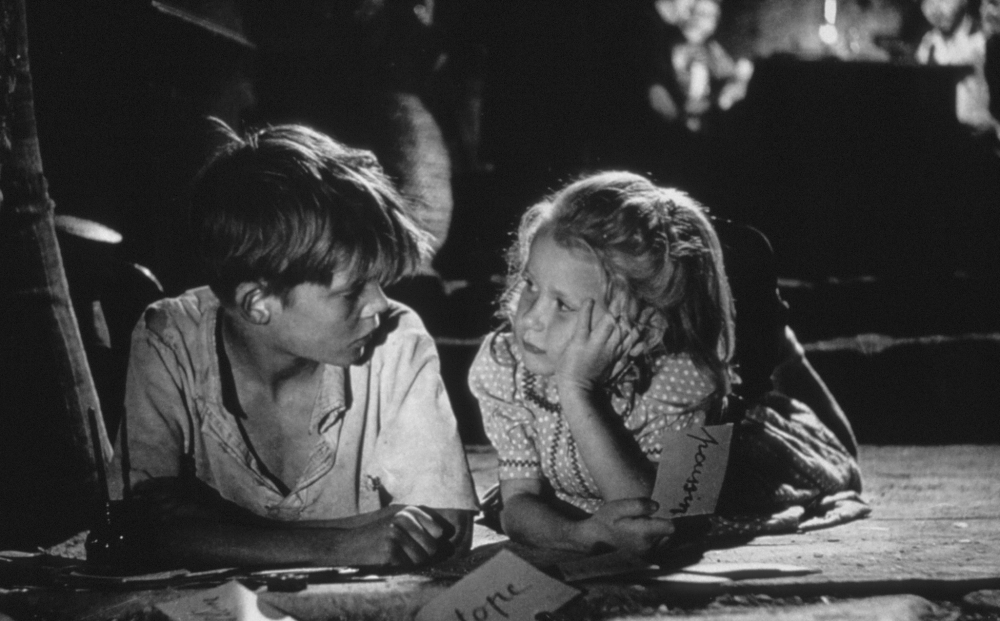René Clément’s ‘Forbidden Games,’ a 1952 Film That Nearly Was Never Made, Gets a Revival at Film Forum
‘Forbidden Games’ won the Grand Prize at the Venice Film Festival and the jury selected 5-year-old Brigitte Fossey as best actress. Clément’s almost impossibly tender movie was also awarded an honorary Oscar.

The revival of René Clément’s “Forbidden Games” (1952) at Film Forum puts one in mind of how cinema, to pinch a phrase from the Scottish poet and novelist Sir Walter Scott, is often woven from a tangled web. Scott was speaking of deception and the circuitous repercussions it can put into motion, but art, particularly those forms dependent upon collaboration, is prone to its own convolutions.
The screenplay for “Forbidden Games” was François Boyer’s first attempt at writing for film and it was met with no interest — zero — from the studios in France. Was it because Boyer was a newbie in the business or, perhaps, was the script’s subject, World War II, too fresh and too freighted a topic for popular consumption? A slew of rejection letters compelled Boyer to transform the script into a novel, “Les Jeux Interdits” (1947).
Upon publication, the shortish book met with a shrug from the French polity. The critic André Bazin wrote that “Les Jeux Interdits” was too American in style and tone to be any good. Did he know that John Steinbeck’s “Of Mice and Men” was a decisive influence on Boyer? Or, perhaps, was Bazin taken aback by the unexpected popularity of the novel in the United States?
Once Boyer’s book hit big on these shores, French filmmakers took a second look. Director Clément sat down with journalist and scriptwriter Pierre Bost to re-adapt “Les Jeux Interdits” for the screen, but only as a middle-section of an omnibus film. Fellow filmmaker Jacques Tati, upon seeing Clément’s short, encouraged him to extend it to feature length. Producer Robert Dorfman agreed. “Forbidden Games” came to fruition.
The film’s troubles weren’t yet over. The French movie-going public, at least initially, stayed home upon its release. Although it had not been submitted by France as an official entry at the 1952 Cannes Film Festival, “Forbidden Games” was screened there all the same. Protests amongst Francophiles came hard-and-fast: What else to do when Clément’s picture portrayed their countrymen as boobs?

A follow-up presentation at the Venice Film Festival caused additional ruckus, particularly when “Forbidden Games” won the Grand Prize and the jury selected 5-year-old Brigitte Fossey as best actress. If that weren’t enough, the Academy of Motion Picture Arts and Sciences bestowed an honorary Oscar upon Clément’s movie. The film ultimately went on to become profitable in its country of origin, perhaps due as much to the surrounding hubbub as to its intrinsic merits.
The prevailing notion at the time was that Boyer, Clément, and Bost were making light of war. If we’re now inclined to peg the reaction as indicative of national chauvinism, that’s not to say it wasn’t informed by the nearness of historical circumstance. At this date, “Forbidden Games” will strike few as being exploitative or demeaning. Notwithstanding an unfashionable lack of guile and an often brusque comedic tone, the picture begins and ends on moments that hit hard. In between, the innocence and confusion of childhood are evoked with rare dexterity.
The story centers on a young girl orphaned by events on the ground, Paulette (Brigitte Fossey), and the 10-year-old son of peasant farmers, Michel Dollé (Michel Dollé). The two children try to make sense of the adults around them, the vagaries of war, and, in their own wide-eyed way, the limits and meaning of faith. The Dollé family agree to house and care for Paulette, but then, one day, a pair of gendarmes arrive in the village.
The cockeyed and complicated game Paulette and Michel contrive as an unspoken means of dealing with loss has the ring of truth to it, and the ending of the film is as ambiguous as it is abrupt. Further explanation would not spoil the movie, but would sully its sense of wonder. “Forbidden Games” is a quickening feat of cinema, sure-footed and almost impossibly tender.

